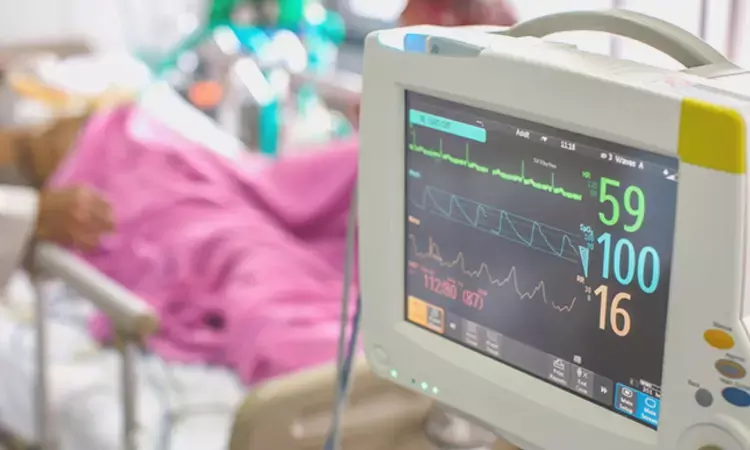- Home
- Medical news & Guidelines
- Anesthesiology
- Cardiology and CTVS
- Critical Care
- Dentistry
- Dermatology
- Diabetes and Endocrinology
- ENT
- Gastroenterology
- Medicine
- Nephrology
- Neurology
- Obstretics-Gynaecology
- Oncology
- Ophthalmology
- Orthopaedics
- Pediatrics-Neonatology
- Psychiatry
- Pulmonology
- Radiology
- Surgery
- Urology
- Laboratory Medicine
- Diet
- Nursing
- Paramedical
- Physiotherapy
- Health news
- Fact Check
- Bone Health Fact Check
- Brain Health Fact Check
- Cancer Related Fact Check
- Child Care Fact Check
- Dental and oral health fact check
- Diabetes and metabolic health fact check
- Diet and Nutrition Fact Check
- Eye and ENT Care Fact Check
- Fitness fact check
- Gut health fact check
- Heart health fact check
- Kidney health fact check
- Medical education fact check
- Men's health fact check
- Respiratory fact check
- Skin and hair care fact check
- Vaccine and Immunization fact check
- Women's health fact check
- AYUSH
- State News
- Andaman and Nicobar Islands
- Andhra Pradesh
- Arunachal Pradesh
- Assam
- Bihar
- Chandigarh
- Chattisgarh
- Dadra and Nagar Haveli
- Daman and Diu
- Delhi
- Goa
- Gujarat
- Haryana
- Himachal Pradesh
- Jammu & Kashmir
- Jharkhand
- Karnataka
- Kerala
- Ladakh
- Lakshadweep
- Madhya Pradesh
- Maharashtra
- Manipur
- Meghalaya
- Mizoram
- Nagaland
- Odisha
- Puducherry
- Punjab
- Rajasthan
- Sikkim
- Tamil Nadu
- Telangana
- Tripura
- Uttar Pradesh
- Uttrakhand
- West Bengal
- Medical Education
- Industry
Add on Ulinastatin in early phase reduces mortality in Covid patients not requiring intubation

A retrospective study published in the Journal of the Association of Physicians of India provides evidence that early administration of Ulinastatin (ULI) as an add-on to standard of care (SOC) may improve outcomes in COVID-19 patients not requiring intubation.
Ulinastatin is a protease inhibitor that has been shown to have anti-inflammatory and immunomodulatory effects, making it a potential candidate for COVID-19 treatment. This study by Yatin Mehta and peers aimed to evaluate the impact of ULI as an add-on to SOC on 30-day mortality in COVID-19 patients requiring ICU admission.
This multicentric, retrospective study collected data on clinical, laboratory, and outcome parameters in patients with COVID-19 admitted to the ICU. Patients were divided into two groups: those treated with SOC alone and those treated with ULI in addition to SOC.
The highlights of the study were:
A total of 94 patients were included in the study, with 47 in each group.
The 30-day mortality rate was significantly lower in the ULI plus SOC group compared to the SOC alone group (36.2% vs 51.1%, OR 0.54, 95% CI 0.30–0.97, p = 0.040).
The effect of ULI on mortality was more pronounced in patients who did not require intubation (10.9% vs 34.0%, OR 0.24, 95% CI 0.09–0.66, p = 0.006) and in those who received early administration of ULI (within 72 hours of admission) (30.7% vs 57.9%, OR 0.32, 95% CI 0.11–0.91, p = 0.032).
On multivariate analysis, intubation was the only predictor of mortality (adjusted OR 10.13, 95% CI 3.77–27.25, p < 0.0001), and the effect of ULI on survival was not significant (adjusted OR 0.58, 95% CI 0.22–1.52, p = 0.270).
The findings of this study suggest that ULI, as an add-on to SOC, may reduce 30-day mortality in COVID-19 patients requiring ICU admission. The effect of ULI was more pronounced in patients who did not require intubation and in those who received early administration of ULI. ULI could still be a beneficial add-on therapy in patients not requiring intubation. However, further studies, preferably randomized controlled trials, are required to validate these findings.
Mehta, Y., Zirpe, K., Dixit, S., Dubey, S., Kanade, R., Kulkarni, A., ... & Kumar, N. (2023). Ulinastatin Add-on to Standard of Care in Critically Ill COVID-19 Patients: A Multicenter, Retrospective Study. Journal of the Association of Physicians of India, 71(2), 25-29. https://doi.org/10.5005/japi-11001-0181
Neuroscience Masters graduate
Jacinthlyn Sylvia, a Neuroscience Master's graduate from Chennai has worked extensively in deciphering the neurobiology of cognition and motor control in aging. She also has spread-out exposure to Neurosurgery from her Bachelor’s. She is currently involved in active Neuro-Oncology research. She is an upcoming neuroscientist with a fiery passion for writing. Her news cover at Medical Dialogues feature recent discoveries and updates from the healthcare and biomedical research fields. She can be reached at editorial@medicaldialogues.in
Dr Kamal Kant Kohli-MBBS, DTCD- a chest specialist with more than 30 years of practice and a flair for writing clinical articles, Dr Kamal Kant Kohli joined Medical Dialogues as a Chief Editor of Medical News. Besides writing articles, as an editor, he proofreads and verifies all the medical content published on Medical Dialogues including those coming from journals, studies,medical conferences,guidelines etc. Email: drkohli@medicaldialogues.in. Contact no. 011-43720751


